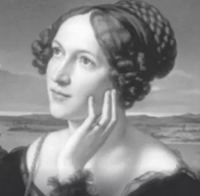| www.tmatlantic.com
Test & Soldering Equipment On-line Store |
|
D.E.V.I.C.E. (Wiki)Calculators Services |
|||||
Filter by first letter
|
Lovelace, Ada
Ada Lovelace is an English mathematician best known for her work on Charles Babbage’s analytical engine. She became the first person to realize that this device is capable of more than elementary calculations, and she was also the first one to publish an algorithm designed for this machine. Augusta Ada King, Countess of Lovelace (Byron), was born on December 10, 1815 in London. Her father was the famous English poet George Byron and her mother was Anne Isabella Milbanke. She inherited mathematical abilities from her mother: Anna Isabella in her youth showed talent in the field of exact sciences, her husband called her "the queen of parallelograms." An important moment in Ada's scientific biography was her acquaintance with Charles Babbage in June 1833. A month later, the mathematician, who appreciated the outstanding abilities of the girl, invited her to see the prototype of his difference engine. Ada was very fond of the invention and tried to visit Babbage as often as possible who being impressed by Lovelace's analytical talents gave the girl the nickname " enchantress of numbers". In 1842-1843, for 9 months, Ada translated from French Babbage's lectures on the Analytical Engine, which was recorded by the Italian mathematician Luigi Menabrea. Lovelace's notes were attached to the translation, and they were 3 times larger than the article. The reason was the unpreparedness of the British scientific community for Menabrea written lecture: British scientists were not interested in this topic, and Ada had to explain the principle of the mechanism. The work of Lovelace was highly appreciated, Michael Faraday himself spoke positively about her work. One of Ada's comments described in detail the algorithm by which the numbers of Bernoulli could be calculated on the Analytical Engine. Later, this work was recognized as the first program that could be played on a computer, despite the fact that Babbage's machine was never constructed during Ada's lifetime. In the notes, Lovelace predicted a great future for the invention of the Babbage, saying that this machine would later be able to independently create formulas, music and painting. But Ada denied the possibility of the emergence of artificial intelligence, believing that the device was not able to generate anything that would go beyond the limits of the algorithms invested in it by man. Ada's accomplishments and contributions to computer science are still a matter of controversy. Researchers doubt whether Ada Lovelace can be consider the first programmer. Opponents of this point of view argue that it was not she who developed the programs, but Charles Babbage, and Ada herself was engaged in the popularization of the Analytical Engine. Defenders of the woman as the first programmer argue that her work on calculating Bernoulli numbers is surprisingly accurate and subtle for its time and cannot be compared with what Babbage had previously written. However, most researchers agree that Ada Lovelace was the only person who fully appreciated the potential of the Analytical Engine and was able to foresee what changes such research would bring. Despite the debate about Lovelace's scientific achievements, it is known that the programming terms "work cell" and "cycle" were introduced by her. |
|
Site mapPrivacy policyTerms of Use & Store PoliciesHow to BuyShippingPayment |

























